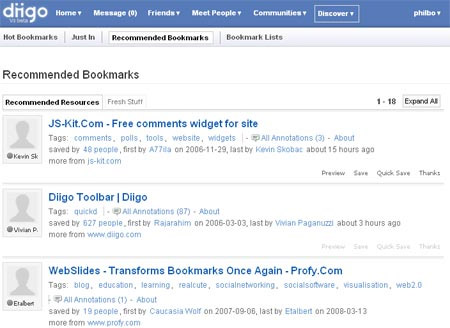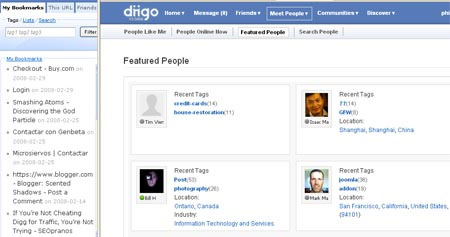Diigo is perhaps one of the web’s premier research tools – this is widely accepted. Whether Web 2.0 actually ever existed is irrelevant, but the innovation brought to us these last two years is undeniable. The big question for me has been:
“Does the innovation actually do anything for us?” I think I have tested and reviewed over 300 startups in the last couple of years, and I can honestly say that most of this innovation has been directed at entertainment or rather useless “cuteness”. Diigo as a tool, could be viewed as a much more serious innovation by comparison.

With the release of Version 3, Diigo has fairly effectively expanded its reach into the social networking venue even farther. Aside from that, the inherent tools available on Diigo as a aggregationa and research platform have been expanded greatly also. So many startups have been either hyped or constructively accentuated that it is sometimes difficult to put an actual value on them, this is not the case for any of Diigo’s faithful users.
Version 3
The “community” buzz word has really invaded our Web consciousness these days, but the actual effectiveness and potential productivity of these communities is what should really be stressed. Diigo’s community, in using all the function of Diigo’s innovation and refinements, has the ability to help build relationships based around perhaps our greatest asset – knowledge. Diigo’s latest release of Version 3 illustrates the proper metamorphosis of a truly valuable community, or content and data reflected on a growing and engaged set of people. The innovators developed a way to collect and store knowledge efficiently, and then refined the platform to foster collaboration in learning.

Beyond Bookmarks
The Diigo platform was developed around the Diigo browser add on) that enables people to actually highlight and perform functions on sections of or whole Web pages. The purpose was and is to help people grab relevant content and effectively aggregate, save and/or store this data. Diigo essentially transformed the bookmark into a more usable and effective data collection tool and has also enabled a very unique and positive community aspect with V3. Diigo basically enables people to study and research as one would in a library – by taking pertinent pieces of the knowledge puzzle and putting them where they are accessible, functional and more easily utilized.
- Diigo’s Collaborative Research Platform – This is the premise on which Diigo was built, a platform for gathering, using and sharing information. Not just any information, but highly filtered and relevant information beyond the weightiness of full Web pages and extraneous data. Diigo allows users to add, gather or extract from pages of information and then share or work with others to further refine knowledge. Users can define their content on a group, community and ultimatly on a personal level via this even more enhanced UI.
- Social Content Site – The aggregate gathered annotated data on Diigo provides a collective repository quite unlike any other. Data becomes knowledge refined at Diigo because of the human filtering aspect inherent in the way people can “slice” or refine their annotations and bookmarks. Essentially everything gathered on to the Diigo platform becomes either a personal or communicative volume in the Diigo library. In this was Diigo content is perhaps more social than on any other site. Searchability and the host of Diigo user tools make endless the possibilities in utilizing this storehouse of information.
The Power of Suggestion
Version 3 has more than 100 refinements to help users more efficiently interact with knowledge and data. Perhaps the best of all these tools is the new sidebar that makes it simple to see your annotations, links, notes and even the suggested or similar data of other users. The sidebar interface is much more visible and interactive than even Diigo’s previous interface and light years ahead of the closest competitor. Combined with the Diigo toolbar makes Diigo an even more powerful collaborative tool. Users now have the ability to search and select suggested data from other users as well as suggesting relevant knowledge to their friends. Suggestion, when presented by like minded users, can effectively act as a knowledge filter which narrows search to a fine point. This is what Diigo can be best at, presenting relevant knowledge in a much more filtered and refined way.
The bottom line on any startup or existent company is the value the user derives from it. Entertainment, communicative and frivolous utility is great, but I think a mixture of serious tools with what we might call “academic coolness” is what makes a Web 2.0 service tick. Diigo has these qualities in abundance and unlike other simple bookmarking tools – a networing anc collaborative aspect. In a real way I do not understand how anyone would need another bookmarking or annotation service. It is also a little puzzling that Diigo has not taken the Web by storm. Perhaps there are not enough people with serious research or knowledge needs out there. But that is a question for another discourse, I suggest checking Diigo out.


